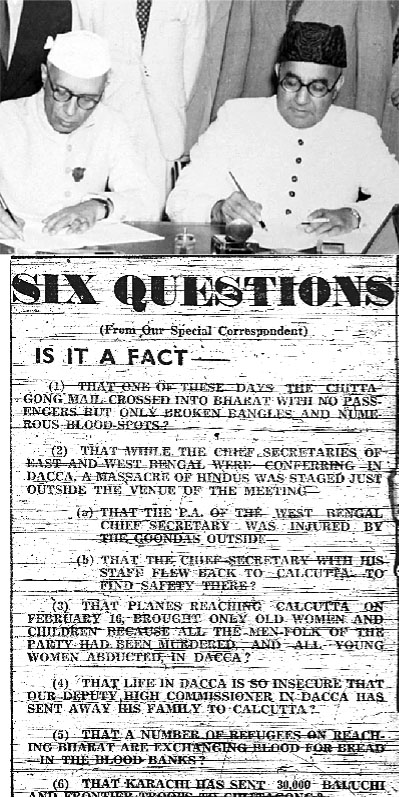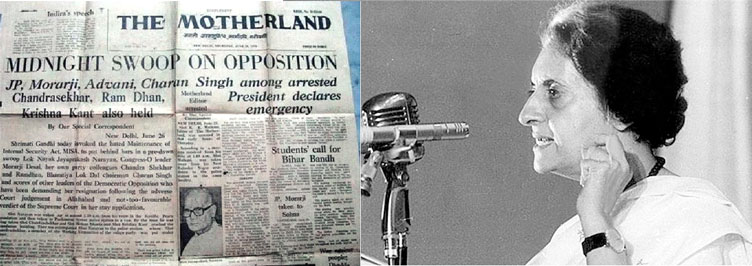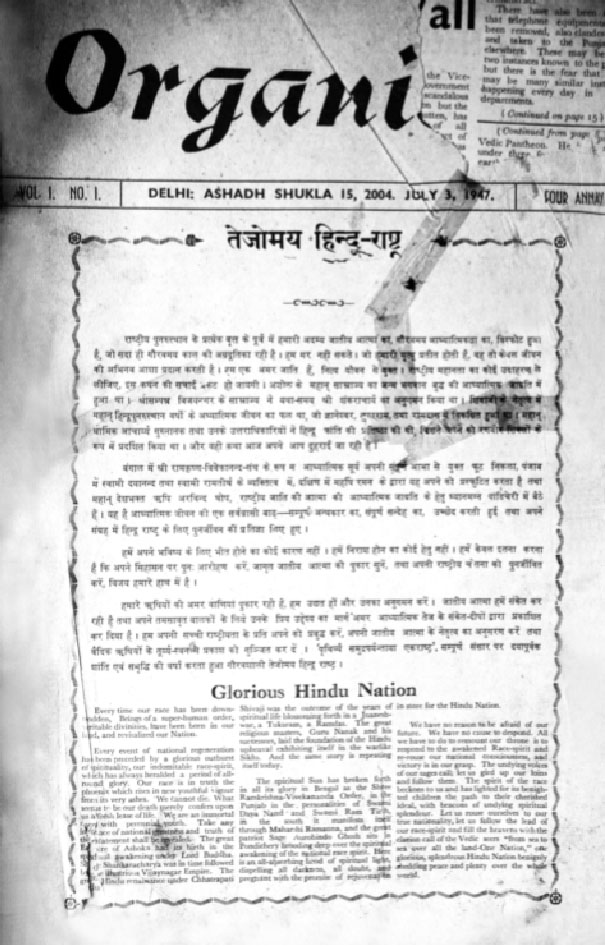The Organiser from its inception championed freedom of press. It exposed Nehru Government for being soft towards Pakistan even when Hindus were massacred in East Pakistan in the wake of Partition
RSS founder Dr KB Hedgewar did not like publicity or communication about his organisation. The objective was that the youth attend RSS ‘shakha’ to learn about things. This changed, however, when RSS grew in strength among Hindus, especially youth, particularly with the rise of militancy by the Muslim League that came to be run by Mohammad Ali Jinnah. RSS leaders also felt a vital need to launch a means of communication to express their views on political and social matters concerning India. Thus, Bharat Prakashan Trust was established in late 1946, with a then good sum of Rs 4 lakh raised from among its workers and sympathisers. The Organiser was born on July 3, 1947, just about a month before India’s Independence on August 15, 1947. Soon after, in 1948, after India’s Partition that was accompanied with riots, Bharat Prakashan got hold of a big part of the Latifi Press that was known to have published the Dawn newspaper, founded in 1933 in Delhi by Abdul Latif Khan. Latifi Press printed several important publications for the Muslim League. In fact, the first issue of the Dawn was printed in the Latifi Press on October 12, 1942. The Latifi Press also published The Illustrated Weekly of India, besides many Muslim works.
The period marked a great transformation of the Indian political scene. The colonial rulers were determined to free India as early as possible, despite winning the Second World War in 1945. Colonial powers were reeling under a war-torn economy. Britain’s Labour Party‘s Clement Richard Atlee became the Prime Minister, replacing the war hero Winston Churchill. In India, the Muslim League supported by the British had succeeded in getting India partitioned, making it a separate country for the Muslims. Indian National Congress led by Jawaharlal Nehru and Sardar Vallabh Bhai Patel agreed to the Partition of India. It will not be out of place to mention that the British named the Indian National Congress representing Hindus. The Hindu Mahasabha’s claim was not upheld at the Roundtable Conference held in London to decide on an independent India. It was a great lapse on the part of Hindu organisations to let the Congress represent Hindus, while Jinnah claimed that his Muslim League was the sole representative of Muslims. This, in spite of Congress’ claim that it also represented Muslims. The RSS should have either taken upon itself to represent Hindus or allowed the Hindu Mahasabha to do so.

Mahatma Gandhi’s assassination on January 30, 1948 cleared the way for Prime Minister Nehru to ban the RSS, blaming it for Gandhiji’s murder. It must be noted that RSS Sarsanghchalak Guruji called Gandhi’s assassination an unpardonable sin, and suspended RSS shakhas for 13 days in mourning. I remember vividly that a huge procession tried to burn the Organiser office at Daryaganj in the walled city along with its staff. Alas, Gandhian Jayaprakash Narayan led the then anti-RSS rally In Delhi. It was an RSS lawyer, also in-charge of Organiser, late VP Joshi who foiled the Congress-led plan to burn the Organiser press along with the staff working there.
Sardar Patel’s Intervention
The first editor of Organiser was the late KR Nair. Incidentally, the first editor of Dawn was none other than the distinguished journalist Pothan Joseph. It may be recalled that Bharat Prakashan also published a Hindi Daily titled Bharatvarsh under a famous Hindi editor, but the publication didn’t survive for long. Late Shri Amar Nath Bajaj, a gazetted officer, was the publisher of the Organiser. The Organiser too was banned following Gandhiji’s murder. Since it was a huge press, the then Deputy Prime Minister and Home Minister Sardar Vallabhbhai Patel later released Bajaj and opened the press to print ration cards for Delhi citizens.
Exposing Nehru Government For Building Bridges With Pak
The Organiser has had a glorious past in as much as it faced Government restrictions from its inception. When the Government of India lifted the ban on RSS in 1949, the Organiser began its journey to continue its struggle for the causes dear to it. No sooner than India became Republic on January 26, 1950, Prime Minister Nehru in 1951 brought in the First Amendment to the Constitution, drastically curbing the freedom of expression and speech and clamped down on voices critical of the Government. Nehru was upset with the Organiser because the publication was quite critical of the Nehru Government in the wake of the Partition of India in 1947 and later because of widespread communal violence against Hindus in Dhaka (erstwhile East Pakistan) and had sought that Muslims evacuate property to be distributed among Hindu refugees. Nehru was criticised for proposing confidence-building measures with Pakistani Prime Minister Liaquat Ali Khan, even though Hindus were being targeted there. The Organiser published Nehru and Liaquat cartoons in a report ‘Villains vs Fools’. Organiser had written that “the villainy of Pakistan is matched only by our idiocy”. On March 2, 1950, a gag order was issued against the Organiser by the Delhi Chief Commissioner, ordering Editor KR Malkani and publisher Brij Bhushan to submit all content related to communal issues or Pakistan including cartoons for Government approval. However, the bold Editor Malkani didn’t budge an inch and wrote an editorial on March 13, 1950 that read: “If the administration earnestly wants ugly facts not to appear in the press, the only right and honest course for it is effectively to exert itself for the non-occurrence of such brutal facts. Suppression of facts is no solution to the Bengal tragedy. Surely the government does not hope to extinguish a volcano by squatting more tightly on its crater”.

On April 10, 1950, the Organiser’s publisher and printer Brij Bhushan, and Editor Malkani moved the Supreme Court to get the pre-censorship order quashed. The Organiser was represented in court by former Hindu Mahasabha President and eminent jurist NC Chatterjee, who pleaded that the pre-censorship order was an infringement of the freedom of speech. Chatterjee also argued that the law under which this order has been issued doesn’t fall under any provisions in the Constitution of India, thus calling the pre-censorship order illegal. The Chief Justice of the Bombay High Court, Justice MC Chagla castigated the Nehru Government in a public lecture at Pune on May 1, 1950. Chagla said, “The Constitution had not left it to the party in power in the legislature or the caprice of the executive to limit, control or impair any fundamental rights,” adding “The right to express opinion, however critical it might be of the government or society as constituted, was one of the most fundamental rights of the individual in a democratic form of government.” The Supreme Court in its verdict on May 26, 1950, quashed the pre-censorship. The court added that under Article 19 of the Constitution, restrictions could be imposed on freedom of expression only in certain cases that were given in clause 2 of the Article. Public order was not one of the grounds, so no restriction on the freedom of expression could be imposed on the grounds of ‘Public order’. However, Nehruji didn’t desist and introduced more curbs on freedom of expression through the first amendment. Despite fierce resistance from within his party as well as in Parliament and media, Nehru moved the Constitution (First Amendment) Act, 1951, on May 10, 1951 and got it enacted on June 18, 1951. Interestingly, this amendment was triggered by various factors, including two landmark judgments of the Supreme Court which changed the contours of the freedom of speech and expression as it stands today. This is a part of history that Supreme Court Justice M Patanjali Sastri had to pay a huge price for it. He was not made chief justice of the Supreme Court like Mrs Indira Gandhi deprived Justice HR Khanna of his chance during the Emergency. This is another matter that after the entire Supreme Court threatened to resign, Nehru had to succumb and Justice Sastri became the CJI and served till 1954.
The Organiser has continued its journey in spite of thorns in its way to date. In 1952, the weekly opposed Federalism and separate provincial governments. It also opposed the linguistic reorganisation of the states besides opposing the Hindu Code Bill.
The Organiser went on with its struggle also during the regime of Indira Gandhi. Malkaniji launched an English daily titled The Motherland on February 1, 1971. The newspaper was fondly read as it reported on Indira Gandhi’s autocratic rule until it was seized by the Government on June 26, 1975, following the imposition of the Emergency. Bharat Prakashan must be applauded to let the Organiser continue its glorious past to date.














Comments